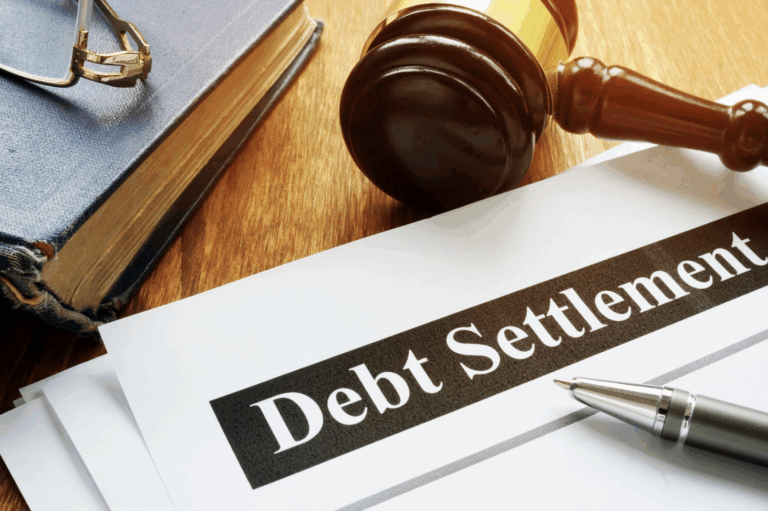Creditors who’ve won a lawsuit against you for an unpaid debt have greater access to debt collection tools. One of these tools is wage garnishment. This debt collection method automatically withholds a portion of your paycheck to repay the delinquent debt.
Even though a won judgment gives creditors the legal basis to request wage garnishment, it likely won’t happen immediately after the judgment is filed. There are federal and state regulations that define how long after a judgment wages can be garnished, garnishment limitations, and your consumer rights as a judgment debtor.
Understanding Wage Garnishment
When a creditor sues you in court, it suggests that they’ve been unsuccessful at receiving payment from you for a delinquent debt. During the court proceedings, each party presents its arguments, and a judge makes a decision on the lawsuit.
Its decision is called a court order or judgment. Wage garnishment is a debt collection practice that can only be unlocked with a judgment in the creditor’s favor. Examples of delinquent debt that can result in wage garnishment include:
- Consumer debt, like credit cards and personal loans.
- Student loan debt, like private student loans.
- Business debt, like merchant cash advances and business lines of credit.
- Support payments, like child support or spousal support.
- Past due taxes, like federal or state taxes.
In wage garnishment, your employer automatically deducts a portion of your earnings each pay period from your disposable income. Disposable income is your take-home pay, after mandatory deductions like income taxes and retirement contributions are withheld. Income types that can be garnished include wages from an employer, commission, bonuses, overtime pay, severance pay, and insurance settlement payouts to name a few.
However, certain types of income are exempt from wage garnishment. The following are protected income classes:
- Social Security benefits.
- Civil Service Retirement payments.
- Disability payments.
- Veteran’s benefits.
- Child support.
- Alimony support.
Timeframe for Garnishment After a Judgment
From the date a judgment is entered against you, there might be a window of time before funds can be withheld from your employer’s payroll.
1. Immediate Post-Judgment Phase
When a judgment is filed against you, it means the court determined that you’re liable for the amount on the order. This debt must be paid to the creditor, not the court.
You have the right to appeal the judgment after it’s issued, if you believe a substantial legal mistake was made. The timeline for filing an appeal notice to the court varies by the civil case type and state.
2. The Waiting Period
The creditor might not be able to start the wage garnishment process immediately after the judgment is issued. Some states have a waiting period before garnishments can be started. How long after a judgment wages can be garnished depends on state laws of the district court.
For example, in California, judgment creditors must wait 30 days from the date the judgment was issued to you before they can file a Writ of Execution for garnishment. By comparison, in New Jersey, creditors who want to collect through wage garnishment must file a Wage Execution within 45 days of serving you.
3. Starting Wage Garnishment
To initiate wage garnishment, the creditor must file a Writ of Garnishment or Writ of Execution with the court. An executed garnishment order is then served to your employer (the “garnishee”). This court-ordered mandate directs them to withhold part of your wages until the debt is satisfied.
The creditor is also legally required to notify you of the wage garnishment in advance.
Determining Factors for Wage Garnishment Timeline
How quickly a creditor can start the wage garnishment process is based on various factors. As described above, state regulations enforce different steps and timelines that creditors must observe before funds can be taken from your paycheck.
Additionally, the type of debt that’s delinquent affects how soon after a judgment your wages can be garnished. For example, garnishment for consumer debt often involves a lengthy process beforehand, but if you owe unpaid taxes your wages can be garnished sooner. This is because the IRS and your local tax authority aren’t required to go through the court system to enforce wage garnishment.
How Much of My Paycheck Can Be Taken by Wage Garnishment?
There are regulations and limitations related to wage garnishment at the federal and state levels.
Federal Law & Limitations for Wage Garnishment
The Consumer Credit Protection Act (CCPA) of 1968 established various consumer protections from banks, lenders, creditors, and other debt collectors. A misconception is that wage garnishment gives creditors free access to 100 percent of your income. Rest assured this isn’t the case.
Under Title III of the CCPA, federal regulation restricts garnishment to whichever is lesser of:
- Up to 25 percent of your weekly disposable income, or
- The amount of your weekly disposable earnings that’s 30 times above the federal minimum hourly wage.
Depending on your situation or the type of debt in question, there are exceptions to these limitations. For example, the above limitations don’t apply to wage garnishments resulting from unpaid state or federal taxes, or bankruptcy court orders.
Garnishment limits vary for monies due in support of a person. If you owe unpaid alimony or child support, the maximum garnishment limits range from 50 to 60 percent of your disposable income.
Federal law under the CCPA also protects your employment during this time. It prohibits employers from firing you for one wage garnishment order.
State Regulations
Although there are federal laws and protections in place regarding wage garnishment, states can enforce their own regulations. Each state specifies its own garnishment limits for certain types of debt, and rules that serve to protect consumers from debt collection.
The state of Texas, for example, prohibits wage garnishment for ordinary debts, like consumer loans and credit cards. However, it allows wage garnishment for other unpaid debts, like child support, alimony, and taxes.
Connecticut somewhat follows federal limitations that allow wage garnishment for either a percentage of weekly disposable income, or the equivalent of weekly disposable above a minimum hourly wage. However, for the latter option, it sets the bar at 40 times the federal hourly minimum wage or the state’s minimum wage.
How to Respond to a Wage Garnishment Notice
If a creditor notifies you of its intent to garnish your wages, there are a few ways you can respond.
Paying the Judgment
The fastest way to move forward from wage garnishment is paying off the debt immediately. Paying the full judgment amount before your wages are withheld avoids the long-term effects of garnishment.
However, this isn’t always a feasible option. Assess your finances, including other active debts you’re repaying, to determine whether you can realistically afford a lump-sum payment.
Negotiating With the Creditor
An alternative to paying the full judgment amount upfront is negotiating a repayment plan with the creditor. Determine how much you can reasonably afford and installment intervals, and propose your plan to the creditor.
Before agreeing and making any payments to the creditor, ensure that you have all the terms of the payment plan in writing. This includes the total amount that’s agreed on, due dates, and other promises made by the creditor, like if they agree to halt collections efforts while you’re making payments. Often, this is challenging since the creditor now has the upper hand.
Contacting a Legal Professional
Get legal help from a knowledgeable legal debt professional or debt solutions law firm to understand all of your options, their advantages, and the caveats involved. Depending on your state laws, you might be able to contest the garnishment through a Claim of Exemption. A Claim of Exemption can help you reduce the amount being garnished, if it adversely impacts your basic needs.
Although you can file for this exemption on your own, a skilled attorney can offer peace of mind during the process. They can prepare case documentation for the court, and create a response with supporting facts if the creditor opposes your exemption.
Preparing for Wage Garnishment
Judgment creditors can enact collection methods, like wage garnishment, to recoup an unpaid judgment debt if you don’t voluntarily do so. Wage garnishment can severely impact your day-to-day budget and cash flow in your bank account.
Seek out appropriate debt help legal services to learn about all of the options available to you or to stop or resolve wage garnishment matters before it’s too late.
No two scenarios are the same. Addressing a wage garnishment can be time-consuming and complex if you try to handle it on your own. The attorneys at Tayne Law Group may be able to help you navigate this serious debt hurdle. Get a free phone consultation by calling (866) 890-7337 or complete this short contact form. We never sell or share your information. All calls are confidential.





